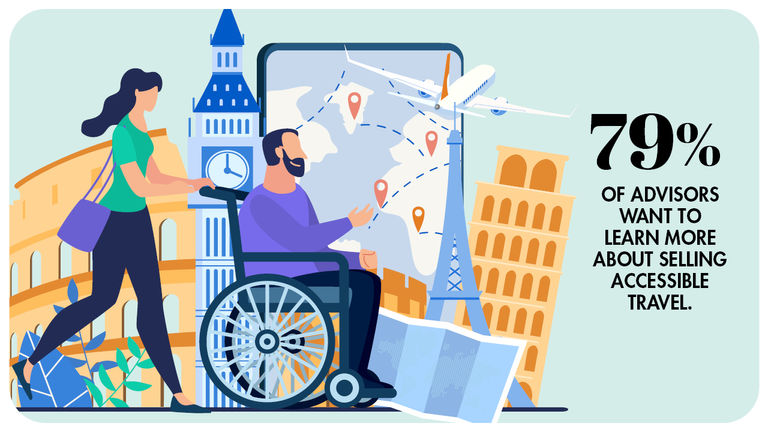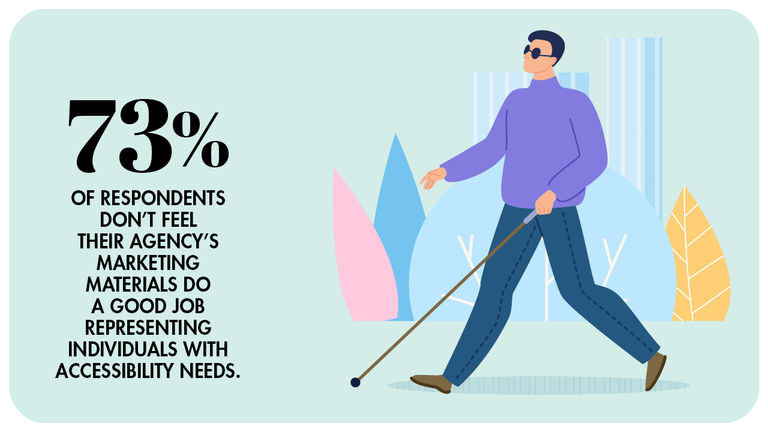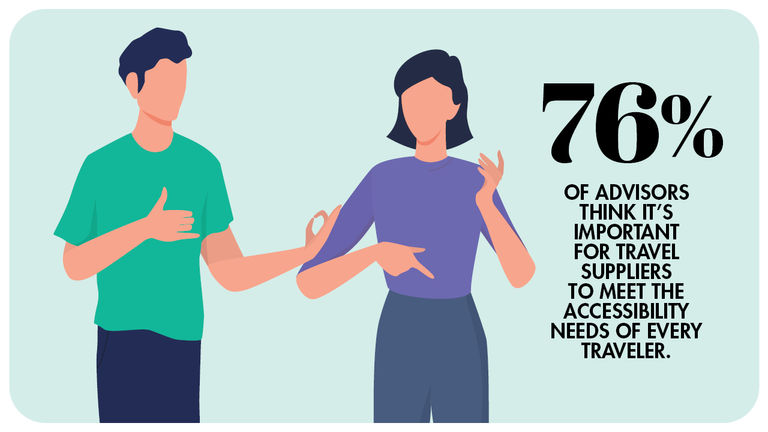Accessible travel is an important topic to most travel advisors, according to recent research by TravelAge West, part of its Need to Know research series. The survey of more than 250 advisors shows that nearly two-thirds (63%) currently have clients who identify as having a disability or accessibility needs. Another 79% say they are interested in learning more about selling accessible travel in the future.
 79% of advisors want to learn more about selling accessible travel.
79% of advisors want to learn more about selling accessible travel.
Credit: 2023 TravelAge West
“I am constantly being contacted by travel agents with questions on many aspects of accessible travel,” said Debra Kerper, an accessible travel specialist and independent franchise owner with Cruise Planners. “I’m always happy to assist if I can, but travel advisors need to be very careful not to take on more than they can handle. Renting a scooter or wheelchair for a client with limited mobility is a far cry from planning an accessible vacation for a full-time wheelchair user with multiple needs.”
Three in four advisors (76%) are confident that they are currently able to find solutions that meet individual accessible travel needs; however, 81% feel that more education on accessible travel will help their business.
Most advisors (76%) say it’s extremely important for travel suppliers to meet the accessibility needs of every traveler.
 Nearly three-fourths of travel agents don't feel their agency's marketing materials are fully representative of all travelers.
Nearly three-fourths of travel agents don't feel their agency's marketing materials are fully representative of all travelers.
Credit: 2023 TravelAge West“Over the course of my 30-year career specializing in the needs of disabled travelers, I have probably spoken to almost every vendor out there trying to put together trips that will work,” Kerper said. “Simple tasks such as getting accessible accommodations guaranteed at all-inclusive resorts and hotels can be almost impossible. The adage, ‘If you build it, they will come,’ is so true. Just ask the cruise lines — accessible cabins sell out week after week. If all-inclusives would guarantee their accessible rooms, put in a pool lift and have a beach wheelchair, my clients would flock to these resorts in a heartbeat.”
The adage, ‘If you build it, they will come,’ is so true. Just ask the cruise lines — accessible cabins sell out week after week.
Most advisors (68%) think suppliers do a “very” or “somewhat” good job catering to travelers with accessibility needs; however, almost a one-third (32%) say they do a poor job.
Respondents feel that cruise lines do the best at catering to individuals with accessibility needs (34%), followed by hotels and resorts (29%) and airlines (26%). Destinations get the lowest marks (2%) followed by tour operators (3%).
Of the advisors who have clients with accessible travel needs, most have mobility issues, followed by clients living with autism/who are neurodivergent and those with hearing or vision limitations. Most respondents (73%) feel that their agencies’ marketing materials do not adequately represent individuals with accessibility needs.
 Most travel advisors think it's important for suppliers to meet the accessibility needs of all travelers.
Most travel advisors think it's important for suppliers to meet the accessibility needs of all travelers.
Credit: 2023 TravelAge WestKerper agrees with this response. She pointed out that while Cruise Planners has great marketing materials, she often avoids sending them to her clients because, in nearly all cases, the product being marketed is not accessible.
“Our vendors put out beautiful ads and commercials that entice travelers, and I get calls and emails from clients asking me if these trips are accessible,” Kerper said. “Other than most ocean-going cruise ships, they are not. I understand why we don’t see marketing materials aimed at the disabled population, but it represents the bigger problem that the travel industry is not inclusive.”
Need to Know Survey Series
“Need to Know” is a research series from TravelAge West that tracks the responses of advisors as they relate to various travel trends and topics. This survey recorded the responses of 251 advisors across the U.S. Click here to see more Need to Know stories.